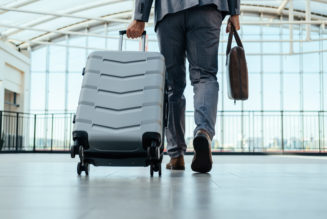
Rick Steves never checks a bag when traveling — and he strongly encourages all of his fellow globetrotters to do the same.
“It’s more important than ever to travel light,” he said. “Two weeks, two months, man, woman, winter, summer, it doesn’t matter, you just need a carry-on bag.”
Steves is known for his popular European guidebooks, tour company Rick Steves’ Europe, and public television travel show. As a professional international traveler, Steves is an expert at avoiding common travel mistakes like lost luggage, overbooked restaurants, and crowded sights.
While a few travel problems are sometimes inevitable, Steves advocates for flexibility, which is at the core of his travel philosophy. In a recent interview with Travel + Leisure, Steves shared some of his best tips to help alleviate frequent travel issues and reduce trip anxiety.
Dominic Arizona Bonuccelli/Courtesy of Rick Steves’ Europe
Pack Light and Skip Tight Connections
Besides the occasional need to pack his hiking poles, Steves is adamant that travelers should only bring along a carry-on bag. Every year, Rick Steves’ Europe takes 30,000 people on small-group tours, and all travelers are limited to just a carry-on — no checked luggage allowed.
“If you don’t check a bag, you’re much less likely to get ensnared in all of the airport chaos in Europe,” Steves said.
Carry-on luggage is less likely to get stolen, lost, or broken, and Steves also loves that it helps with flexibility — you can easily switch flights without worrying about leaving your whole wardrobe behind. Plus, he said, if you are worried about limited space, packing cubes are a worthwhile investment to help organize and compress clothes in a smaller bag.
“You need to roll with the punches,” Steves said.
Steves is also a proponent of scheduling airline connections with plenty of time, especially for international trips. For instance, U.S. travelers visiting countries in the European Schengen Zone have to go through passport control when arriving in their first Schengen country. So, if your final destination is Greece, but your layover is in Germany, make sure the connection timing in Germany accounts for the possibility of long immigration lines.
Book Your Top Reservations, Then Go With the Flow
Steves believes 2023 is going to be a busy travel year, with sales of his guidebooks currently matching where they were at this time in 2019, previously the company’s best year ever. With the coronation of King Charles in London in May, and the Olympics in Paris next year, Steves wants travelers to understand that some crowds are going to be inevitable.
“People really need to respect that there are going to be a lot of crowds in Europe,” he said.
Travelers who don’t do any planning in advance often end up waiting in long lines, wasting valuable time queuing outside of a museum, rather than spending than extra time inside. Steves recommends using a guidebook, like his own, that has been researched after the worst years of the pandemic to account for any changes to reservation systems and updated hours.
“More than ever, people are going to the same famous places,” he said. “Museums want to moderate their mob scenes.”
A notable change these days, he said, is many sights are still requiring online bookings to help control large crowds, which they started doing during the pandemic and have kept up in order to mitigate the chaos of long lines outside. In updating his guidebooks, Steves said he is focused on making sure there is a sidebar for each chapter reviewing what visitors need to do in advance.
For instance, Steves said well-organized travelers visiting Amsterdam have just four things they need to book ahead of time: the Anne Frank House, the Van Gogh Museum, the Rijksmuseum, and one trendy restaurant for a nice dinner.
“The flip side of that coin is that everything else is fine. You don’t need reservations for all the other stuff,” he said. “If a serendipitous opportunity presents itself, the answer has always got to be ‘yes.”
Once you have the core set of reservations you need, the rest of your trip can easily fall into place, Steves said. Don’t worry about making a dinner reservation every night — instead, visit a street with local eateries and pick a delicious, non-touristy spot.
“We tend to be too figured out these days,” he said. “It takes away some of the joy of travel, which is letting things unfold in an unpredictable way.”
Courtesy of Rick Steves’ Europe
Avoid Overcrowded Spots
Steves said he’s noticing that so many travelers now source recommendations from social media — and that has repercussions. The consequence, he said, is that when everyone goes to the same place, trying to get the same picture, it becomes overcrowded and hard to enjoy.
“There might be a place that’s just as good, maybe 90 percent as good, but with no crowds at all just down the street,” he said.
Instead of relying on Tripadvisor or Instagram, Steves said, try to embrace the local culture and you’ll have a less stressful experience.
“I don’t go crazy over what’s No. 1,” he said. “No. 1 is the company that is deemed best in the system. [Instead], we try to find these little mom and pops, these labors of love, these creative adventures — that’s what distinguishes my books and tours.”
Perhaps the most important piece of advice Steves shared is that often, travelers put a lot of pressure on themselves to check off the top museums, historic sites, restaurants, and shops from every “best of” list. But that pressure can lead to a lot of trip anxiety and the feeling of rushing around to go somewhere just because it’s famous.
His best advice? “Assume you will return,” he said. “Never try to do everything on one trip, because you can’t.”









